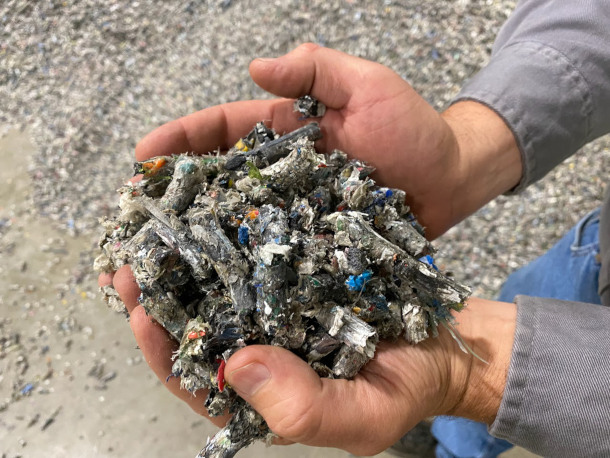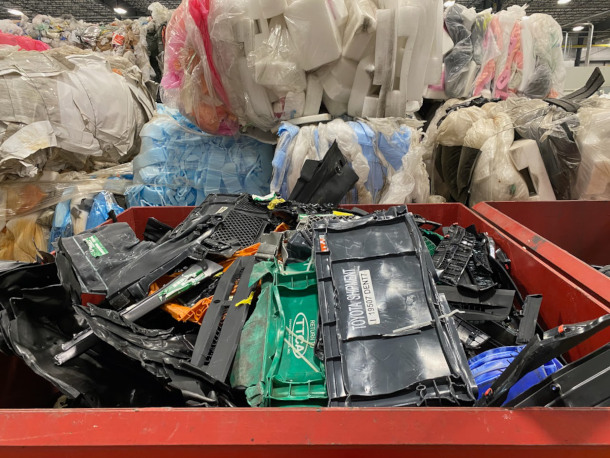The Risks of 'Chemical Recycling'
Air Date: Week of July 14, 2023

Jay Schabel, president of the plastics division at Brightmark, holds plastic pellets in the company’s new chemical recycling plant in Indiana at the end of July. The pellets are made from plastic waste and sent into chemical processing equipment to make diesel fuel, naphtha and wax. (Photo: Courtesy of James Bruggers)
So-called ‘chemical recycling’ of plastics is a highly inefficient process that releases large amounts of carbon emissions and hazardous pollutants. James Bruggers reports for Inside Climate News and joined Host Steve Curwood to discuss the health and safety problems he’s been covering at the Brightmark chemical recycling plant in Indiana.
Transcript
O’NEILL: It’s Living on Earth, I’m Aynsley O’Neill
DOERING: And I’m Jenni Doering.
When plastics are recycled, they have to be sorted according to those numbers 1 through 7. And even when everything does make it into the right bin and facility, you’d be mistaken to think that the plastic enters an endless cycle of rebirth. In reality, numbers 3 through 7 are almost impossible to recycle. And even the more easily recycled number 1 and 2 plastics can’t be infinitely renewed because the polymers they are made of degrade each time the plastic is melted down. Now industry groups like the American Chemistry Council are promoting so-called chemical recycling or “advanced recycling” as a solution. This technique uses high heat, chemical reactions, or both to break down the plastic back into its raw materials so that it can be used to rebuild polymers from scratch. But many scientists and environmentalists say it’s disingenuous to call this process “recycling” since it’s highly inefficient and releases large amounts of carbon emissions and hazardous pollutants. And at the Brightmark chemical recycling plant in Indiana, health and safety concerns have kept the plant from operating at full capacity. James Bruggers has been covering this for our media partner Inside Climate News and joined Host Steve Curwood to explain.
CURWOOD: So, what exactly is chemical recycling and how much recycling is this chemistry?
BRUGGERS: Well, first of all, you know, we need to remember that there just isn't much recycling going on at all. You know, there's globally less than 10% of the plastic waste that's generated gets recycled. And most of that is a mechanical process, where you have this plastic waste that's sorted, it's cleaned, it's shredded, and then it's molded into new plastic products. With chemical recycling, which sort of falls under this industry umbrella of what they call advanced recycling., they break the plastic waste chemically down into its chemical constituents or feedstocks that would be used by the chemical industry to produce new plastic. So, what are some of those feedstocks? Well, naphtha is one, toluene, xylene, benzene and stuff like that. So that's what is going on at a chemical recycling plant. You know, there's just an awful lot of the plastic waste that gets lost in the process because in the case of pyrolysis, it makes a lot of gas, which is then used to create heat for this very heat intensive process. And that gas never gets used to make new plastics, it's kind of lost in the process.

Kory Kistler, left, and Roy Bisnett, had environmental health and safety concerns at the Brightmark chemical recycling plant where they both worked until last year. (Photo: Courtesy of James Bruggers)
CURWOOD: James tell me about some of the environmental health and safety challenges that Brightmark, this company that does this so-called chemical recycling in northern Indiana, what are some of the environmental health and safety challenges that the company has faced, since it began with this plant, what in 2020 I believe it is?
BRUGGERS: Yeah., so my first trip up there last summer, I had written a story about this technology and the troubles that it was having getting started, you know, getting beyond the startup mode. And the follow up story, which I recently did, I became in touch with four former Brightmark employees, one of whom was a pretty senior person who kind of ran the refinery aspect of the chemical side of the operation and I learned about oil spills, one of them in particular that was reasonably sized inside the facility. And then there was another problem, that part of the plant where the bales of plastic are chopped up and turned into pellets well, there's a worker there who worked in that part, who claims that there was so much dust in the air that it gave him lung problems and he's actually sued the company over those issues.
CURWOOD: At one point there was a fairly big fire, I believe, at the Brightmark plant made it into the news. What was that all about?
BRUGGERS: Yeah, they had two fires that were substantial in terms of needing a response from local fire departments and sent a lot of smoke into the air. And these were both a result of, you know, just trying to get their operation going according to the people that I talked to who used to work at this plant. So they were trying to kind of, you know, get this pyrolysis process started and to see if they could continue to make it run for a long enough time to start making the product that they needed and in both those cases, they ended up with a fire that was fueled by very hot gases under pressure, and also this pyrolysis oil and nobody got burned but there were very close calls from what I understand. So, it's like, all of a sudden, you've got this jet fire coming out of a valve or something and people if they had been there, just like five seconds earlier, they would have suffered some pretty serious consequences.

Plastic waste at the Brightmark plant in northeast Indiana awaits chemical processing. (Photo: Courtesy of James Bruggers)
CURWOOD: Now you say this is in a small town, relatively small town in northern Indiana, how has the fire department responded to those fires?
BRUGGERS: You're right, it's a small volunteer fire department. They normally are accustomed to responding to house fires or maybe fires at you know, some sort of business or that sort of thing. They previously did not have a chemical plant in their area and so the fire chief expressed his concern to me that his department didn't have the training that it needed to respond to chemical plant fires, and also that they didn't have the equipment that they needed. He felt that they needed a larger fire truck that would be able to reach, put water in places that were higher and farther away than they might normally have to do. So, I think that there's been some concerns there from the fire department as expressed to me by the fire chief.
CURWOOD: Now, how does that plant in Brightmark fit into the larger picture of the global plastics crisis? We have a very low rate of recycling, and the plastic keeps piling up.
BRUGGERS: Yeah, it does keep piling up and it is a global plastic crisis, we've got the oceans choking on plastic, we've got microplastics found at the highest mountains and the deepest ocean trenches and in our bloodstream and in our feces. It's such a problem right now that all these nations across the world are gathering to meet to develop a plastics treaty, a global plastics treaty by the end of next year. And I don't know if you watch CNN at night or if you scroll on Facebook, but you'll see advertisements about advanced recycling from the American Chemistry Council, the industry group. And so advanced recycling, there are 15 Second blurbs, but they tout this as the solution really to the plastics crisis. And so, while the world is looking for a solution to the plastics crisis, this is what the industry is putting forward. And there's a lot of concerns from scientists and environmental advocates that it's just not ready for primetime, that it's still really in kind of the research and development phase. And there's a lot of reasons why it's difficult for this technology to work. You know, one of them is just that they're trying to solve the problem with mixed plastic waste, what everybody throws in the recycle bin. And there’s this numbering system: plastics one through seven, and these systems like Brightmark are setup to recycle all of them, supposedly, but it just doesn't work that way chemically according to chemistry professors I've talked to. Each product, each plastic product is different and has different chemical makeup and when you mix them all together, some of them don't play nicely with each other. So anyway, there is this big global debate and chemical recycling, or advanced recycling is one of the industry's kind of primary answers to the problem. And there's a lot of effort to get that built into the treaty to get it built into efforts by different state legislatures to tackle the problem but there's also this pushback. And one of the things that we've been trying to do with our reporting is to just sort of fact check this technology and see if it is actually something that's real.
CURWOOD: Now, James, this of course isn't the only chemical recycling plant in the US. I believe there's one in Texas, another one in Pennsylvania. So how has the Biden administration and the EPA responded to these chemical recycling plants?
BRUGGERS: Well, there is one thing that's interesting about regulations, the American Chemistry Council has managed to get I think 24 different states to pass legislation that regulates chemical recycling as manufacturing and not waste management. And so that means that there's some relaxation, it varies state by state, but it means that there's some relaxation of waste management regulations that they would have to comply with in these different states. So, the Biden administration, they recently rejected a proposal from the Trump administration EPA to stop regulating pyrolysis and gasification as incineration. And so, they're going to continue to regulate pyrolysis and gasification as incineration while they continue to study, this issue of chemical recycling and pyrolysis. That means that as these new plants pop up, that presumably, they're going to be required to meet the tougher clean air standards that are associated with incineration. There's a lot of concern on the part of the environmental community that the Biden administration in these treaty talks will end up conceding to pressures from the chemical industry and somehow allow incentives for chemical recycling to get built into this treaty. But that's all undetermined at this point, their treaty, they're not anywhere near that level of detail in what they're talking about, with the treaty talks. It's a big battle all over the country and globally at this point, to be honest.

Austin Acker, a volunteer firefighter, cleans a fire truck at the Ashley, Indiana volunteer fire department firehouse in May 2023. (Photo: Courtesy of James Bruggers)
CURWOOD: So I'm curious about what the Federal Trade Commission is doing along these lines, the FTC has these Green Guides that establish guidelines for companies when they make ads in the environmental sector? Where does chemical recycling fall in their review? I mean, what kind of pressure are they getting from activists to be skeptical about advanced or chemical recycling?
BRUGGERS: Yeah, there's a big fight that's brewing there with those green guides. And I think the biggest issue boils down to claims that companies make about how much recycled content is in the products that they use or make. And people will see the company says, okay, we're going to use 30% recycled content and all the plastic cups or something like that. And so, with chemical recycling where you are basically just taking plastic waste and making just chemicals out of it, and then putting those chemicals in with all the other chemicals that come from oil and gas drilling or whatever in the plastics manufacturing facility, it's difficult to be able to actually account for like, which of those chemical molecules actually ended up in the new plastic cup. And so there just isn't a good accounting method for chemical recycling to actually be able to make those recycled content claims. But the industry is pushing for a certain way to do it and they're getting pushback from the environmental community and also they're getting pushback, interestingly enough, from the national association that represents plastic recyclers, which largely represent the mechanical recyclers. And that's because they don't trust the way that the chemical industry is proposing to track and account for recycled content as well. That's sort of a big sticking point during these green guides that will be important to watch and see how it comes out because in the end, people just want to be able to trust what they see when they look at a cup and what the claims are. You know, people care about the environment, and they want to be able to rely on the claims of the companies.
DOERING: James Bruggers covers the U.S. Southeast for Inside Climate News. He spoke with Living on Earth Host Steve Curwood.
Links
WTHR News Coverage of the chemical recycling plant in Richmond Indiana
Living on Earth wants to hear from you!
Living on Earth
62 Calef Highway, Suite 212
Lee, NH 03861
Telephone: 617-287-4121
E-mail: comments@loe.org
Newsletter [Click here]
Donate to Living on Earth!
Living on Earth is an independent media program and relies entirely on contributions from listeners and institutions supporting public service. Please donate now to preserve an independent environmental voice.
NewsletterLiving on Earth offers a weekly delivery of the show's rundown to your mailbox. Sign up for our newsletter today!
 Sailors For The Sea: Be the change you want to sea.
Sailors For The Sea: Be the change you want to sea.
 The Grantham Foundation for the Protection of the Environment: Committed to protecting and improving the health of the global environment.
The Grantham Foundation for the Protection of the Environment: Committed to protecting and improving the health of the global environment.
 Contribute to Living on Earth and receive, as our gift to you, an archival print of one of Mark Seth Lender's extraordinary wildlife photographs. Follow the link to see Mark's current collection of photographs.
Contribute to Living on Earth and receive, as our gift to you, an archival print of one of Mark Seth Lender's extraordinary wildlife photographs. Follow the link to see Mark's current collection of photographs.
 Buy a signed copy of Mark Seth Lender's book Smeagull the Seagull & support Living on Earth
Buy a signed copy of Mark Seth Lender's book Smeagull the Seagull & support Living on Earth

